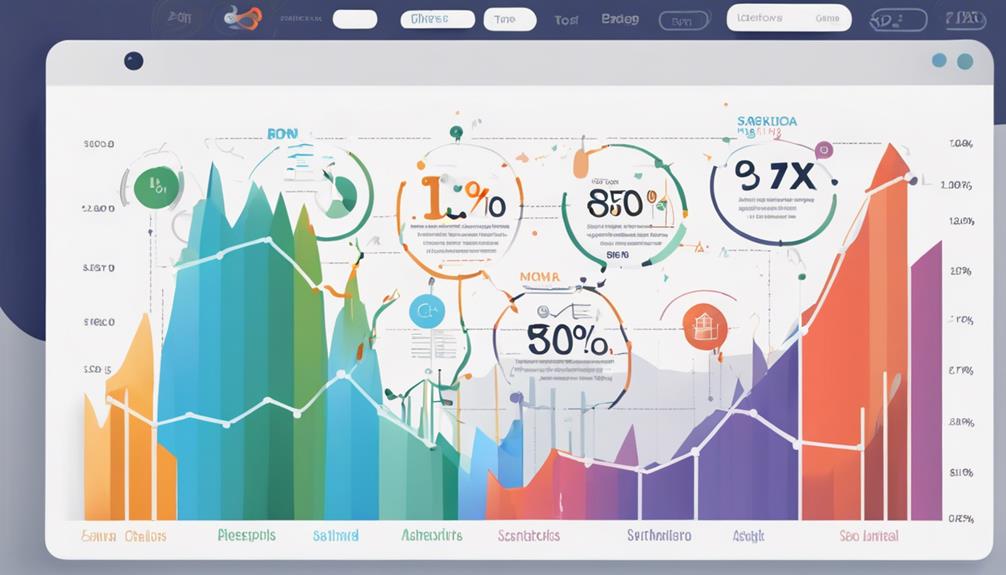
When it comes to optimizing your website for search engines, the significance of long-tail keywords cannot be overstated. These targeted phrases hold the key to unlocking a realm of untapped potential for your online presence.
By understanding how long-tail keywords function and why they are instrumental in SEO strategies, you can elevate your digital visibility and connect with your audience on a deeper level.
But how exactly do long-tail keywords achieve this? Let's unravel the mystery behind their impact on SEO optimization and explore the power they hold in shaping your online success.
Key Takeaways
- Long-tail keywords drive targeted traffic effectively.
- They lead to higher conversion rates and user engagement.
- These keywords align closely with user intent.
- Long-tail keywords are essential for successful SEO strategies.
Importance of Long-Tail Keywords
Long-tail keywords play a pivotal role in modern SEO strategies due to their ability to drive targeted traffic and enhance website visibility effectively. These specific queries capture high-intent search traffic, making them essential for intentional SEO strategies. By focusing on long-tail keywords, you can improve your website visibility and rank for particular search terms. One significant advantage of long-tail keywords is their lower competition compared to short-tail keywords, leading to better conversion rates.
Moreover, incorporating long-tail keywords into your content can help in ranking new pages or boosting the performance of existing ones. This strategic approach not only attracts relevant traffic but also improves SEO performance overall. By understanding the importance of long-tail keywords and leveraging them effectively in your content, you can enhance your website's visibility, attract high-intent traffic, and achieve better conversion rates.
Advantages of Long-Tail Keywords
Harnessing the power of targeted specific queries can significantly amplify your SEO strategy, driving traffic with high conversion potential and enhancing overall website performance. When it comes to long-tail keywords, the advantages are clear:
- Higher Conversion Rates: Long-tail keywords boast a conversion rate 2.5 times higher than short-tail keywords, making them a valuable asset for boosting sales and leads.
- Increased Click-Through Rates: Targeting long-tail keywords can result in a 36% increase in click-through rates, indicating that users find these specific queries more compelling and relevant.
- Enhanced Visitor Engagement: Websites ranking for long-tail keywords experience a 3% higher visitor engagement rate, showing that these keywords attract users who are more likely to interact with your content and stay on your site.
Benefits of Long-Tail Keywords
To maximize the effectiveness of your SEO strategy, leveraging targeted specific queries known as long-tail keywords can provide numerous benefits for your website's performance and overall online presence. Long-tail keywords offer high conversion rates as they attract motivated buyers searching for specific keyphrases. By targeting niche audiences, these keywords drive qualified traffic to your site, enhancing the chances of conversions. Incorporating long-tail keywords in your content can significantly improve your search engine optimization efforts, helping you reach your target audiences more effectively. Nearly 70% of web searches are attributed to long-tail keywords, highlighting their importance in driving more traffic to websites. Below is a visual representation of the benefits of long-tail keywords:
| Benefits of Long-Tail Keywords | |
|---|---|
| High Conversion Rate | Target Niche Audiences |
| Qualified Traffic | Attract Motivated Buyers |
| Specific Keyphrases | Drive More Traffic |
Significance of Long-Tail Keywords
To fully understand the impact of utilizing targeted specific queries in your SEO approach, it's crucial to recognize the fundamental significance of incorporating long-tail keywords. Here are three key reasons why long-tail keywords play a vital role in enhancing your SEO strategy:
- Higher Purchase Intent: Long-tail keywords are more specific and descriptive, attracting users who are actively looking to make a purchase. By targeting these keywords, you can connect with an audience that's further along in the buying cycle, increasing the likelihood of conversions.
- Less Competition: These keywords typically have less competition compared to broader terms. This means that by focusing on long-tail keywords, you have a better chance of ranking higher in search results and attracting relevant visitors to your site.
- Targeted Traffic: Google's SGE technology has made it easier to leverage long-tail keywords in conversational search, driving more targeted traffic to your website. By aligning your content with user needs through specific queries, you can attract a more engaged audience and improve overall user experience.
Impact of Long-Tail Keywords
Utilizing long-tail keywords effectively can significantly impact your website's visibility and engagement by targeting specific user intents with precision. Long-tail keywords play a crucial role in attracting organic traffic, accounting for over 70% of search queries. By aligning your content with these specific user intents, you can drive targeted traffic to your website.
Google's SGE technology further enhances the use of long-tail keywords, particularly in conversational search scenarios where natural language queries are prevalent. The beauty of long-tail keywords lies in their lower competition, making it easier for your website to rank and attract relevant users. This specificity not only helps in driving targeted traffic but also leads to better SEO performance overall.
Embracing long-tail keywords in your content strategy can improve user experience, increase engagement, and ultimately boost your website's visibility in search engine results.
Role of Long-Tail Keywords
Long-tail keywords hold a pivotal role in shaping the specificity and effectiveness of your website's SEO strategy, driving targeted traffic and enhancing user engagement. When considering the role of long-tail keywords, it's crucial to understand their significance in SEO optimization:
- Targeted Search Traffic: Long-tail keywords attract specific, high-intent search traffic to your website, increasing the likelihood of reaching users interested in your content.
- Niche Topics and Low-Competition: By focusing on long-tail keywords, you can rank for niche topics and low-competition search terms, allowing you to stand out in a crowded online landscape.
- Conversion Rates and User Intent: These keywords align closely with user intent, leading to better conversion rates as they cater to what users are actively searching for, improving the overall effectiveness of your SEO efforts.
Incorporating long-tail keywords strategically into your content can significantly enhance your website's visibility and relevance, ultimately driving meaningful traffic and engagement.
Value of Long-Tail Keywords
Considering the prevalence and impact of long-tail keywords in driving targeted traffic and enhancing user engagement, understanding their value is essential for optimizing your SEO strategy effectively. Long-tail keywords, which make up over 70% of search queries, play a crucial role in attracting specific users to your website and kickstarting the buyers' journey, ultimately leading to improved engagement and conversion rates. Google's SGE technology further underscores the importance of long-tail keywords in conversational search, elevating user experience and relevance. By customizing long-tail keywords to align with user needs, brands can increase visibility and attract more targeted traffic to their site. Additionally, monitoring the success of long-tail keywords allows for the evaluation of how well content meets user needs and drives desired outcomes in SEO optimization.
| Value of Long-Tail Keywords | ||
|---|---|---|
| Enhanced User Engagement | Improved Conversion Rates | Better Targeted Traffic |
| Aligning with User Needs | Monitoring Success | Relevance in Conversational Search |
Relevance of Long-Tail Keywords
When considering the relevance of long-tail keywords, you must focus on target audience specificity by honing in on their particular needs and interests. Aligning these keywords with the search intent of users is crucial for capturing qualified traffic that's more likely to convert.
Target Audience Specificity
Enhancing audience specificity through the use of long-tail keywords is crucial for optimizing SEO strategies and maximizing conversion rates. When targeting specific audience segments with long-tail keywords, you can expect higher conversion rates. This approach leads to more tailored content that addresses the niche needs and interests of your specific audience.
By enhancing relevance through long-tail keywords, you improve the value proposition for your intended audience, ultimately increasing the effectiveness of your SEO efforts. Consider these key points:
- Increased Relevance: Long-tail keywords target specific audience segments effectively.
- Conversion Boost: Specific audience targeting often results in higher conversion rates.
- Tailored Content: Audience specificity leads to more personalized and tailored content for niche needs.
Search Intent Alignment
To optimize your SEO strategy effectively and align with user search intent, incorporating long-tail keywords is imperative for enhancing website engagement and conversion rates.
Long-tail keywords facilitate search intent alignment by targeting specific user queries, ensuring your content precisely matches user expectations. By addressing niche topics and user needs more precisely, you can increase relevance, leading to higher engagement levels.
This increased relevance not only boosts SEO optimization but also enhances the likelihood of conversions. Long-tail keywords play a crucial role in attracting targeted traffic to your site, as they help you tailor your content to meet the specific needs and interests of your audience, ultimately driving better results for your website.
How Can Long-Tail Keywords Impact SEO Success?
When it comes to maximizing SEO success with long-tail keywords, the impact is significant. These specific phrases allow websites to target niche audiences and drive more relevant traffic. By incorporating long-tail keywords into content and meta tags, websites can improve their search engine rankings and attract qualified leads.
Conclusion
In conclusion, the significance of long-tail keywords in SEO optimization can't be overstated. By targeting specific search intents and attracting the right audience, brands can drive quality traffic, increase conversion rates, and improve overall online visibility.
The value of long-tail keywords lies in their ability to tailor content to meet user needs effectively, leading to enhanced customer engagement and potential business growth. Embracing long-tail keywords is a strategic move that can set your SEO strategy up for success.
Stay ahead of the competition by leveraging the power of long-tail keywords.


